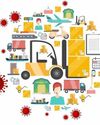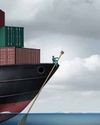
The world finds itself in the grip of an unprecedented pandemic. In many countries, the manufacturing of most commodities, apart from essential goods has come to a complete halt. Shipping and logistics operations too have been greatly affected, which is why industries world over are placing more emphasis on Artificial Intelligence (AI) and automation. In a nutshell, the idea of an autonomous supply chain that offers unprecedented information security finds immediate appeal.
But for those who are not tech savvy, a quick look at the basics first: The simplest way to define AI is to have a software mimic human behaviour that includes ability to learn, think and decide. If you’d extend that simplest of definitions to logistics, there are several opportunities that spring up to enable self learning, correction and decision making in the logistics industry. Logistics in general has at least two distinct resources - the freight/cargo and the firms that move that freight. There is reassuring evidence that both firms and freight are increasingly becoming smart at their atomic levels. This accelerated adoption of technology is due to the inherent desire of knowing the status of freight - where is it, how is it and when will it arrive?
For a supply chain network that covers large geography, AI can provide the much needed granular visibility into where and how your cargo is, learn to recommend corrective actions such as route optimisation, intervention to save the condition of cargo and predict accurately the flow of goods through touch points. “Artificial intelligence is the ability of machines to make smart decisions with the available datasets. By implementing AI in logistics and supply chain, companies can save up to $2 trillion every year,” reveals Purnendu Shekhar, CEO, Cogoport.
This story is from the May 2020 edition of Maritime Gateway.
Start your 7-day Magzter GOLD free trial to access thousands of curated premium stories, and 9,000+ magazines and newspapers.
Already a subscriber ? Sign In
This story is from the May 2020 edition of Maritime Gateway.
Start your 7-day Magzter GOLD free trial to access thousands of curated premium stories, and 9,000+ magazines and newspapers.
Already a subscriber? Sign In

Impact Of Covid-19 On Shipping And Logistics
Industry stalwarts discuss threadbare the prevailing logistics and supply chain scenario and issues in clearing cargo during the COVID-19 lockdown

Digital Platforms Defy Lockdown
Digital trading modules such as eNAM are enabling farmers to move their produce from farm to market even during the lockdown

GARMENT TRADE TRAMPLED
As retailers face a shutdown in US and Europe, the cascading affect has caused mass cancellation of orders in Bangladesh

TRADE RESUMES WITH CHINA
While India has allowed uninterrupted movement of imports into Nepal even during lockdown, China is reopening its borders as it emerges from the pandemic
LESS HUMAN INTENSIVE, MORE DATA DRIVEN
AI provides transformational opportunity for logistics industry by improving customer experience, operational efficiency, faster turnaround time and lower cost while ensuring security and transparency. Macro environment requires industry to transform to be less human intensive, agile and data driven, all of which can be accelerated by AI adoption, shares Gangadhar Gude, Founder & CEO, atai.ai

SHAKEN AND STIRRED
The COVID-19 pandemic has partially paralysed the logistics and supply chain, but the industry is still deterred to ensure supply of essentials continues

TRADE STUCK, ECONOMY SLOWS DOWN
Sri Lankan economy slows down as trade deficit widens and supply chain disrupts amidst lockdown

LENDING INTELLIGENCE TO SUPPLY CHAIN
If you’re shipping millions of dollars’ worth of pharmaceuticals, high-end electronics, expensive seafood, or precious metals, what would you be willing to pay for the ability to ‘ask’ your shipment where it is right now and whether it’s ok? What would you pay for a freight smart enough to raise an alarm before it spoils? Artificial Intelligence enables that and much more…

CONTAINER LINES SIGNAL ‘SOS'
As the per-unit cost of operations increases many lines are forced to blank sailings which has hit their bottom line real hard. The Government and Terminal Operators therefore need to actively consider reduction in Vessel Related Costs

IMO 2020 And The Covid-19 Curse
The COVID-19 outbreak has shaken and stirred the already volatile bunker market. While the refiners adjust their capacities and shipping lines choose their path to compliance, the market dynamics are yet to reach an equilibrium